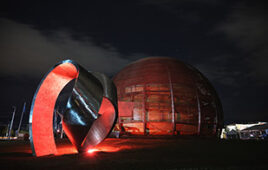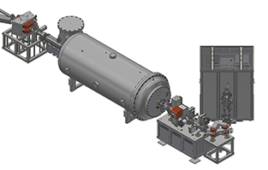 Southwest Research Institute and The University of Texas at San Antonio are collaborating to combine two catalytic processes into a single reactor, with the overall goal of recycling carbon from CO2 to produce low-cost hydrocarbon fuels. The work, led by Dr. Grant Seuser of SwRI’s Powertrain Engineering Division and Dr. Gary Jacobs of UTSA’s College of Engineering, is supported by a $125,000 grant from the Connecting through Research Partnerships (Connect) Program.
Southwest Research Institute and The University of Texas at San Antonio are collaborating to combine two catalytic processes into a single reactor, with the overall goal of recycling carbon from CO2 to produce low-cost hydrocarbon fuels. The work, led by Dr. Grant Seuser of SwRI’s Powertrain Engineering Division and Dr. Gary Jacobs of UTSA’s College of Engineering, is supported by a $125,000 grant from the Connecting through Research Partnerships (Connect) Program.
Greenhouse gas emissions are expected to increase by about 17% by 2040 as a result of increasing energy and transportation needs in the developing world.
“We’re facing a lack of renewable fuels and the technology to deliver cleaner power generation,” said Seuser. “We’re seeing a rise in battery-powered passenger vehicles, but the high-power demands of the aviation, locomotive, shipping and long-haul trucking industries will continue to require energy-dense hydrocarbons for the foreseeable future.”
Seuser and Jacobs propose using a process called carbon dioxide (CO2) hydrogenation to produce cleaner renewable liquid hydrocarbon fuels for transportation. To accomplish this, they plan to build a single reactor capable of performing two chemical processes in one step. The first will react hydrogen with CO2 to make carbon monoxide (CO) and the second will convert the CO and hydrogen, a blend known as synthesis gas or syngas, into liquid hydrocarbon fuel by a catalytic process known as Fischer-Tropsch synthesis.
“Fischer-Tropsch synthesis was discovered in Germany about a century ago and is still used in places like South Africa and Quatar to convert coal and natural gas into liquid hydrocarbon fuels. Plant capacities ranging from tens of thousands to hundreds of thousands of barrels of fuel per day. It will be an interesting challenge to integrate this catalytic technology into a process that uses CO2 in the feed,” Jacobs said.
Additionally, the process the SwRI-UTSA team is developing will be able to utilize CO2 captured at fossil fuel-fired power plants that would otherwise be sequestered underground or emitted into the atmosphere.
“Combining the functionality of these two catalytic processes, reverse water-gas shift and Fischer-Tropsch synthesis, into a single reactor would simplify the process and increase its economic viability,” Jacobs said.
The effort will also explore novel catalyst formations aimed at combining reverse water-gas shift and Fischer Tropsch synthesis functions, which Jacobs will create and characterize at UTSA. Seuser will use the catalysts in a SwRI reactor to assess their industrial viability.
“Reducing the complexity of converting CO2 into hydrocarbon fuels would have a big impact,” Seuser said. “Finding a way to produce low-carbon fuels and maintain our current energy infrastructure is critical to avoid further increases in Earth’s temperature.”
SwRI’s Executive Office and UTSA’s Office of the Vice President for Research, Economic Development and Knowledge Enterprise sponsor the Connect program, which offers grant opportunities to enhance greater scientific collaboration between the two institutions.
For more information, visit Catalyst Formulation





Tell Us What You Think!